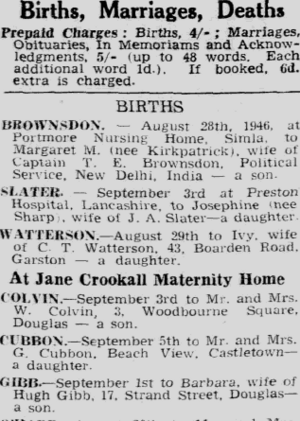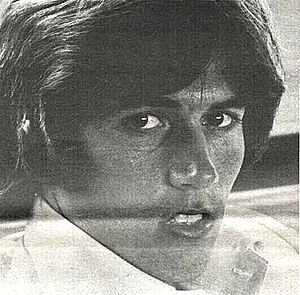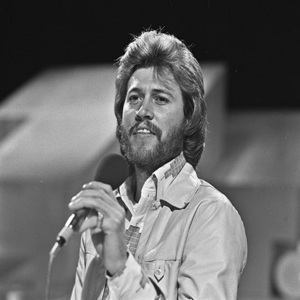Barry Gibb facts for kids
Quick facts for kids
Barry Gibb
|
|
|---|---|
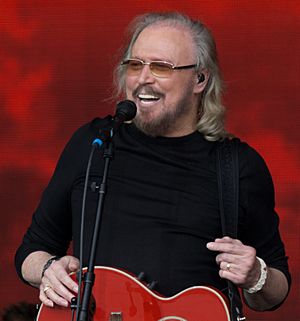
Gibb performing at Glastonbury Festival 2017
|
|
| Born |
Barry Alan Crompton Gibb
1 September 1946 Douglas, Isle of Man
|
| Other names | Johnny Hayes |
| Occupation |
|
| Years active | 1958–present |
| Spouse(s) |
|
| Children | 5, including Steve |
| Parent(s) |
|
| Relatives |
|
| Musical career | |
| Origin | Manchester, England |
| Genres | |
| Instruments |
|
| Labels | |
| Signature | |
Sir Barry Alan Crompton Gibb is a famous British musician, singer, songwriter, and record producer. He was born on September 1, 1946. Barry became globally famous with his younger twin brothers, Robin and Maurice, as part of the Bee Gees. This group became one of the most successful music groups ever.
Barry Gibb is known for his amazing singing voice, especially his high-pitched falsetto. His music career has lasted for over 70 years. He has written or co-written many hit songs. He shares a record with John Lennon and Paul McCartney for having the most consecutive number one songs on the Billboard Hot 100 chart, with six each. In total, he has written or co-written sixteen Billboard Hot 100 number one hits.
In 1994, Barry and his brothers were added to the Songwriters Hall of Fame. In 1997, the Bee Gees were inducted into the Rock and Roll Hall of Fame. Q magazine ranked him as number 38 on its list of the "100 Greatest Singers" in 2007. Guinness World Records lists him as the second most successful songwriter in history, right after Paul McCartney.
Barry Gibb received special honors for his contributions to music. He was made a Commander of the Order of the British Empire (CBE) in 2002. He was also knighted as a Knight Bachelor in 2018 for his work in music and charity. In 2022, he was made an Honorary Companion of the Order of Australia.
Contents
- Barry Gibb's Early Life and Family
- Barry Gibb's Musical Journey
- Starting Out: Early Performances and Songwriting (1955–1966)
- Becoming Famous: Return to the UK and Worldwide Success (1967–1970)
- Solo Debut and Bee Gees Reunion (1970–1974)
- Disco Success and Hit Songs (1975–1980)
- Producing for Other Artists (1980–1983)
- Solo Projects and Break from the Bee Gees (1983–1986)
- Later Musical Activities (1987–2002)
- Maurice's Passing and Bee Gees' Semi-Retirement (2003–2012)
- Current Activities (2012–Present)
- Barry Gibb's Personal Life
- Musical Influences
- Barry Gibb's Legacy and Achievements
- Barry Gibb's Solo Music
- See also
Barry Gibb's Early Life and Family
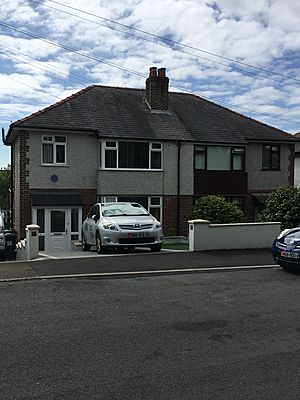
Barry Alan Crompton Gibb was born in Douglas, Isle of Man, on September 1, 1946. His father, Hugh Gibb, was a drummer, and his mother, Barbara Gibb, was a homemaker. Both of his parents were from Manchester, England. Barry has an older sister named Lesley Evans. His middle name, "Alan," was given in memory of his father's youngest brother who passed away as a baby.
When Barry was a baby, his father worked as a musician in hotels. His mother stayed home to care for the children. The Gibb family moved homes several times in Douglas. When Barry was almost two years old, he had a serious accident. He was badly burned by a hot teapot and spent about two and a half months in the hospital. Barry later said he doesn't remember this time, but he still has the scars.
In 1949, Barry's two younger brothers, Robin and Maurice, were born. They were twins. The family moved again when the twins were young. Barry started school in 1951, just after his fifth birthday. He attended Braddan School and later Tynwald Street Infants School. In 1953, he went to Desmesne Road Boys School.
Barry Gibb's Musical Journey
Starting Out: Early Performances and Songwriting (1955–1966)
In 1955, the Gibb family moved back to Manchester, England. There, Barry and his brothers formed a skiffle group called the Rattlesnakes. Barry sang and played guitar, while Robin and Maurice sang and played acoustic guitar. They played songs by artists like Cliff Richard and the Everly Brothers. Their first professional show was on December 28, 1957.
Around 1958, the brothers changed their group's name to Wee Johnny Hayes and the Blue Cats. They often performed in a talent show for young people. In August 1958, the Gibb family moved to Australia. On the ship, they met Kylie Minogue's parents. In Australia, the group became known as the Bee Gees.
In 1959, the brothers started singing at the Redcliffe Speedway to earn money. A radio deejay named Bill Gates noticed their talent. He was also interested in Barry's original songs. Barry left school in 1961, and the family moved to Surfers Paradise. The brothers spent summers performing in hotels and clubs.
In 1963, the Bee Gees signed with Festival Records. Barry wrote their first single, "The Battle of the Blue and the Grey". He wrote all of the Bee Gees' singles from 1963 to 1966. Many other Australian artists also recorded Barry's songs during this time. One of his songs, "One Road," became a big hit for Jimmy Little in Australia. In 1966, Barry won an award for his song "I Was a Lover, A Leader of Men."
Becoming Famous: Return to the UK and Worldwide Success (1967–1970)
The Bee Gees returned to the United Kingdom in early 1967. They met Robert Stigwood, who became their manager. The group released their first international album, Bee Gees' 1st. The song "To Love Somebody", sung by Barry, became a classic. Many artists have covered it since.
Barry and Robin Gibb experienced a lot of stress from their growing fame. In late 1967, they traveled to Australia for a break. They celebrated Christmas there with their manager's family.
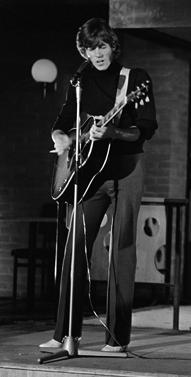
By 1968, the brothers sometimes disagreed about the group's musical direction. The Bee Gees appeared on popular TV shows like The Smothers Brothers Show and The Ed Sullivan Show. Barry also wrote "Only One Woman", which was a hit for the group the Marbles.
In 1969, the Bee Gees released "First of May". Soon after, Robin decided to pursue a solo career for a short time. The Bee Gees released their first single without him, "Tomorrow Tomorrow". Barry also worked with other singers, writing and producing songs for them. By the summer of 1969, only Barry and Maurice remained in the Bee Gees.
The film Cucumber Castle, which featured Barry and Maurice, aired on BBC2 in December 1970. When the group announced they had split up in late 1969, Barry spent time writing new songs.
Solo Debut and Bee Gees Reunion (1970–1974)
In February 1970, Barry began recording his first solo album, The Kid's No Good. He released his first solo single, "I'll Kiss Your Memory". This song reached number 16 in the Netherlands. The other songs from the album were not officially released at the time.
In April 1970, the album Cucumber Castle was released. It featured only Barry and Maurice. Barry also appeared as a judge and performed two songs at a pageant in Germany. He said he missed performing for people. In July 1970, Barry traveled to Australia and gave an interview. He said that even though the Bee Gees had broken up, he was still close with his brothers.
Barry considered releasing "One Bad Thing" as his second solo single. However, the Bee Gees decided to reunite. Their reunion single, "Lonely Days", was released around August. Barry also gave "One Bad Thing" to his friend, Australian singer Ronnie Burns, who released it as a single.
In August 1970, the Bee Gees reunited and recorded new music. They wrote "Lonely Days" and "How Can You Mend a Broken Heart" during their first session back together. In 1971, "How Can You Mend a Broken Heart" became their first number one hit in America.
Barry continued to be a strong creative force for the group. By 1972, he decided to focus completely on the Bee Gees. The album To Whom It May Concern was their last album recorded at IBC Studios. In 1972, Barry moved to Los Angeles to record. In 1973, the Bee Gees moved to Robert Stigwood's RSO Records. After a tour in early 1974, the group started performing in smaller clubs in England.
Disco Success and Hit Songs (1975–1980)
In early 1975, the Bee Gees moved to Miami to work on a new album. They worked with R&B producer Arif Mardin. The first song to feature Barry's famous falsetto voice was "Nights on Broadway" in 1975. In 1976, Barry wrote "I Just Want to Be Your Everything", which became his brother Andy Gibb's first number one hit in the US. Barry also sang backup vocals on the song.
In November 1977, the film Saturday Night Fever was released. Its soundtrack became one of the best-selling soundtracks ever. Barry co-wrote "Emotion" for Samantha Sang, which became her most famous hit. Between December 1977 and September 1978, seven songs written by Barry reached number one in the United States. Andy Gibb's song "Shadow Dancing", written by all four Gibb brothers, was also a US number one.
In 1978, Barry wrote the title song for the musical Grease. Singer Frankie Valli recorded it, and it became a number one hit in the US. After the Bee Gees' successful 1979 tour, Barry wrote, produced, and sang on most of the songs for Andy Gibb's final album, After Dark, released in 1980.
Producing for Other Artists (1980–1983)
In September 1980, Barry produced three new songs for Andy Gibb's first greatest hits album. In October 1980, Barbra Streisand's album Guilty was released. Barry and his team produced it. The song "Woman in Love" became a number one hit in the US. Barry also sang duets with Streisand on "Guilty" and "What Kind of Fool", both of which were Top 10 hits.
In 1981, the Bee Gees released Living Eyes. This album was not a big commercial success. In 1982, Barry was asked to write songs for Dionne Warwick. He produced her album Heartbreaker. Barry wrote all the songs on the album except one.
In 1983, Barry met Kenny Rogers, who asked him to write some songs. Barry recorded demos for Rogers, including "Eyes That See in the Dark". He continued to record demos and songs for the Bee Gees' film Staying Alive. In August 1983, Barry produced Rogers' new album, Eyes That See in the Dark. This album included the famous duet "Islands in the Stream" by Rogers and Dolly Parton, which became a best-selling country song.
Solo Projects and Break from the Bee Gees (1983–1986)
In August 1983, Barry Gibb signed a multi-album deal with MCA Records for North America. In September 1984, his solo album Now Voyager was released. Two singles from the album were "Shine, Shine" and "Fine Line". A film called Now Voyager, starring Barry Gibb, was also released. It included music videos for most of the songs from the album.
In 1985, Barry started recording demos for Diana Ross's album Eaten Alive. In the same year, he co-wrote most of the songs on Robin Gibb's album Walls Have Eyes.
In late 1985 and early 1986, Barry wrote new songs for his next album, Moonlight Madness. However, this album was not released at the time. Most of its songs were released later in 1988. Barry also co-wrote three songs for Swedish singer Carola. In 1985, he joined a group called the Bunburys with David English.
Later Musical Activities (1987–2002)
In early 1987, the Bee Gees began recording their first album in six years. Barry and Maurice also produced four new songs for Andy Gibb. In 1987, Barry co-wrote "Up the Revolution" for Elton John. In 1988, Barry recorded two new songs for the film Hawks. The film's soundtrack was released in September 1988. Barry performed all the songs on it except one by Diana Ross.
Around 1990, the Bee Gees recorded High Civilization. Barry also played guitar and produced songs for other artists like Kelli Wolfe and Lulu. In 1993, the Bee Gees recorded and released Size Isn't Everything. A planned tour in 1994 was canceled because Barry had arthritis in his back, hand, and knee.
Barry co-wrote "I Will Be There" for Tina Turner's album Twenty Four Seven. In 2001, he co-wrote "I Cannot Give You My Love" for Cliff Richard. In September 2001, the Bee Gees re-recorded "Islands in the Stream", but Barry did not participate in that session. In 2002, Barry and Michael Jackson recorded "All in Your Name". Barry also sang background vocals on Michael Bublé's version of "How Can You Mend a Broken Heart".
Maurice's Passing and Bee Gees' Semi-Retirement (2003–2012)
Maurice Gibb passed away suddenly on January 12, 2003. Ten months later, in November, Barry produced and sang background vocals for two songs by Cliff Richard. On May 2, 2004, Barry and Robin Gibb received their CBE awards at Buckingham Palace. Their nephew Adam accepted Maurice's award for him.
In 2004, Barry co-wrote and sang background vocals on his son Steve Gibb's solo single "Living in the Rain." In January 2005, Barry and Robin joined many artists to record a charity single, "Grief Never Grows Old." This song helped victims of the 2004 tsunami in the Indian Ocean. In April and May 2005, Barbra Streisand recorded songs for her new album, which Barry produced.
In August 2006, two of Barry's singles, "Doctor Mann" and "Underworld," were released on iTunes. "Underworld" was featured on the soundtrack of the film Arctic Tale. In December 2006, Barry joined other musicians to ask the British Government to extend copyright protection for sound recordings.
In 2007, "Drown On the River" was released as a single on iTunes. It later appeared on the soundtrack of the film Deal. Barry also sang background vocals on Jamie Jo's song "U Turn Me On" and wrote the theme music for ITV's Grease Is the Word. Barry also appeared as a mentor on American Idol.
On March 14, 2009, Barry teamed up with Olivia Newton-John for a concert in Sydney, Australia. This concert was a fundraiser for victims of the 2009 Victorian Bushfires. On July 10, 2009, Barry was made a Freeman of the Borough of Douglas (Isle of Man). This honor was also given to his brother Robin and, after his passing, to Maurice. In late 2009, Barry and Robin announced plans to perform together again as the Bee Gees.
In 2010, Barry decided not to appear on the Gorillaz album Plastic Beach. In December 2011, two of his songs, "Grey Ghost" and "Daddy's Little Girl," were released. On February 21, 2012, Barry performed his first solo concert in the U.S. He sang "How Can You Mend a Broken Heart" with Maurice's daughter, Samantha Gibb. Barry's son Steve also played guitar and sang a song. On May 20, 2012, Robin Gibb passed away, leaving Barry as the only surviving Gibb brother.
Current Activities (2012–Present)
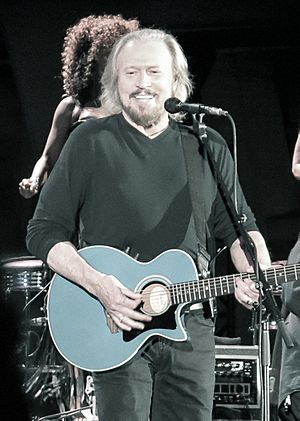
Barry Gibb performed for the first time at the Grand Ole Opry on July 27, 2012. He sang three songs with Ricky Skaggs. Skaggs later recorded "Soldier's Son" with Barry's vocals.
In 2013, Barry started a world tour in Australia called the Mythology Tour. His son Steve and Maurice's daughter Samantha joined him on stage. During this tour, Barry performed some Bee Gees songs live for the first time. A music video for the Bee Gees' 2001 song "Technicolor Dreams" was also shown. This tour led to the release of a box set of the Bee Gees' early Australian albums.
On October 27, 2013, Barry appeared at the Country Music Hall of Fame with Kenny Rogers and Bobby Bare. Barry performed "Islands in the Stream" with Kelly Lang. In October, he performed at the Grand Ole Opry again with Ricky Skaggs. On December 21, 2013, Barry Gibb made a surprise appearance on the US television show Saturday Night Live. He shared the stage with Jimmy Fallon, Justin Timberlake, and Madonna. Paul McCartney was also there and embraced Barry during the closing credits.
On January 27, 2014, Barry appeared on Late Night with Jimmy Fallon to announce his first solo tour of the US. He performed "You Should Be Dancing" with Fallon's band, the Roots. Barry and Fallon also sang some Everly Brothers songs. Barry was interviewed by CNN, where he spoke about his brothers. In a Mirror interview in July 2014, Barry said his wife Linda and Paul McCartney helped him through his grief after Robin's passing. Barry appeared on a Paul McCartney tribute album, The Art of McCartney, performing "When I'm Sixty-Four".
On February 8, 2015, Barry Gibb presented an award at the 57th Annual Grammy Awards with the group Pentatonix. On March 26, 2015, Barry was a headliner at the Hard Rock Rising Miami Beach Global Music Festival.
On June 26, 2016, Barry was scheduled to perform at the Glastonbury Festival in England but had to cancel due to a family illness. However, he did appear with Coldplay as a guest performer, singing "To Love Somebody" and "Stayin' Alive".
On June 28, 2016, it was announced that Barry Gibb had signed with Columbia Records. He released his second solo album, In the Now, on October 7, 2016. This was his first album with all new material since the Bee Gees' final studio album in 2001. His sons Stephen and Ashley co-wrote the album.
On June 25, 2017, Barry Gibb performed at the Glastonbury Festival in England. On November 6, 2020, Barry announced his latest album, Greenfields. This album features duets with country artists like Dolly Parton and Alison Krauss. It includes 11 Bee Gees songs and one unreleased Gibb song, re-imagined as country songs.
In December 2023, Barry was honored at the 46th Annual Kennedy Center Honors for his contributions to American culture. In 2024, Barry focused on the planned Bee Gees movie, serving as an executive producer.
Barry Gibb's Personal Life
Barry Gibb's first marriage was to Maureen Bates on August 22, 1966. They divorced in July 1970.
While taping a TV show in London, Barry met Linda Gray, a former Miss Edinburgh. They were married on September 1, 1970, which was Barry's 24th birthday. They have five children together, including Stephen. Barry also has seven grandchildren. Barry and his wife became U.S. citizens in 2009, but they also kept their UK citizenship.
Barry Gibb became friends with Michael Jackson. He mentioned that Michael would visit his home in Miami. Barry said they would spend time together writing songs. Barry misses his friend Michael.
Barry owns a home in the UK, but he has lived mostly in the US since 1974. In 2006, Barry bought the former home of country singers Johnny Cash and June Carter Cash in Tennessee. He planned to restore it and use it as a place to write songs. Sadly, the house was destroyed by fire in 2007 during renovations. A new house was built, and the property was sold in 2014.
On July 10, 2009, Barry Gibb was made a Freeman of the Borough of Douglas. This honor was also given to his brother Robin and, after his passing, to Maurice.
Musical Influences
When Barry Gibb was in the Rattlesnakes, he was influenced by artists like Tommy Steele, the Mills Brothers, the Everly Brothers, Paul Anka, and Cliff Richard. The Bee Gees said they would sing like the Everly Brothers and then add a third harmony. This style helped create songs like "New York Mining Disaster 1941". When Barry heard Roy Orbison's song "Crying", he felt it was an incredibly powerful voice.
Barry Gibb also admires the singing skills of Frankie Valli. He said that Frankie Valli created a style that many artists still try to copy. Barry was also influenced by country music. He said, "Country music always inspired us. I love Nashville and I love this music."
Barry Gibb's Legacy and Achievements
In 2007, Q magazine ranked Barry Gibb at number 38 on its list of '100 Greatest Singers'.
Barry Gibb had a very successful career as a member of the Bee Gees. The group is one of the all-time top-selling music artists. When the Bee Gees were inducted into the Rock and Roll Hall of Fame in 1997, it was noted that only a few artists had sold more records than them. The Bee Gees' contribution to the Saturday Night Fever soundtrack helped it sell over 50 million copies. It was the top-selling album until Michael Jackson's Thriller. The Bee Gees are the only group in pop history to write, produce, and record six number one hits in a row.
Grammy Awards
Barry Gibb has won six Grammy Awards from 15 nominations. He also has two special honorary Grammy awards.
| Year | Category | Nominated work | Result |
|---|---|---|---|
| 1978 | Best Pop Vocal Performance by a Group | "How Deep Is Your Love" | Won |
| 1979 | Album of the Year | Saturday Night Fever | Won |
| Best Pop Vocal Performance by a Duo or Group | Saturday Night Fever | Won | |
| Best Arrangement of Voices | "Stayin' Alive" | Won | |
| 1981 | Best Pop Performance by a Duo or Group with Vocal | "Guilty" | Won |
| 2003 | Legend Award | Bee Gees | Won |
| 2015 | Lifetime Achievement Award | Bee Gees | Won |
The three Gibb brothers were appointed Commanders of the Order of the British Empire (CBE) in 2002. Barry was also awarded a knighthood in 2018. In 2022, he was made an Honorary Companion of the Order of Australia. In 2023, he became a Kennedy Center Honoree for his contributions to American culture.
Barry Gibb is a very successful songwriter. In 1977, five of his songs were in the Top Ten of the Billboard Hot 100 at the same time. For one week in March, four of the top five songs were written by him. His songs were number one for 27 out of 37 weeks from December 1977 to September 1978. Barry also holds a unique record: he is the only songwriter to write four number one hits in a row in the US.
As a songwriter, Barry Gibb has had number one songs in the 1960s, 1970s, 1980s, 1990s, and 2000s. His song "Islands in the Stream" became number one in the UK in 2009. He is the only male artist to have 10 songs on the 600 biggest songs of the Hot 100 Billboard in its history.
Many artists have recorded Barry's songs for the Bee Gees, including Celine Dion, Olivia Newton-John, Elvis Presley, Kenny Rogers, Diana Ross, Barbra Streisand, and Dionne Warwick. Australian musician David Campbell compared Barry Gibb to Brian Wilson of the Beach Boys, saying Barry's melodies made the songs timeless.
Barry's solo songs have also been recorded by many artists. As a record producer, Barry Gibb produced albums for Andy Gibb, Barbra Streisand, Dionne Warwick, Kenny Rogers, and Diana Ross.
Australian Songwriters Hall of Fame
The Australian Songwriters Hall of Fame honors great Australian songwriters.
| Year | Nominee / work | Award | Result |
|---|---|---|---|
| 2022 | Barry Gibb, Maurice Gibb and Robin Gibb | Australian Songwriters Hall of Fame | inducted |
Barry Gibb's Solo Music
Studio Albums
| Year | Album details | Peak chart positions | ||
|---|---|---|---|---|
| AUS |
UK |
US |
||
| 1984 | Now Voyager
|
— | 85 | 72 |
| 2016 | In the Now
|
3 | 2 | 63 |
| 2021 | Greenfields
|
1 |
1 | 15 |
Soundtracks
| Year | Album details |
|---|---|
| 1988 | Hawks
|
Compilations
| Year | Album details |
|---|---|
| 2006 | The Guilty Demos
|
The Heartbreaker Demos
|
|
The Eyes That See in the Dark Demos
|
|
The Eaten Alive Demos
|
Unreleased Albums
| Album details |
|---|
The Kid's No Good
|
Singles
| Year | Single | Peak chart positions | Certifications (sales thresholds) |
Album | ||||||
|---|---|---|---|---|---|---|---|---|---|---|
| UK |
AUS |
US |
US Dance |
US AC |
GER |
NED |
||||
| 1970 | "I'll Kiss Your Memory" | — | — | — | — | — | — | 16 | Singles only | |
| 1978 | "A Day in the Life" | — | — | — | — | — | — | — | Sgt. Pepper's Lonely Hearts Club Band (soundtrack) | |
| 1980 | "Guilty" (with Barbra Streisand) | 34 | 37 | 3 | — | 5 | 15 | — |
|
Guilty (Barbra Streisand album) |
| 1981 | "What Kind of Fool" (with Barbra Streisand) | — | — | 10 | — | 1 | — | — | ||
| 1984 | "Shine, Shine" | 95 | 87 | 37 | — | 8 | 45 | — | Now Voyager | |
| "Fine Line" | — | — | — | 50 | — | — | — | |||
| 1988 | "Childhood Days" | — | — | — | — | — | 60 | — | Hawks (soundtrack) | |
| 2006 | "Doctor Mann" | — | — | — | — | — | — | — | Singles only | |
| "Underworld" | — | — | — | — | — | — | — | |||
| 2007 | "Drown On the River" | — | — | — | — | — | — | — | ||
| 2011 | "All in Your Name" (with Michael Jackson) | — | — | — | — | — | — | — | ||
| "Grey Ghost" | — | — | — | — | — | — | — | |||
| "Daddy's Little Girl" | — | — | — | — | — | — | — | |||
| 2020 | "Butterfly" | — | — | — | — | — | — | — | Greenfields | |
| "—" denotes releases did not chart | ||||||||||
See also
 In Spanish: Barry Gibb para niños
In Spanish: Barry Gibb para niños
 | Jessica Watkins |
 | Robert Henry Lawrence Jr. |
 | Mae Jemison |
 | Sian Proctor |
 | Guion Bluford |


